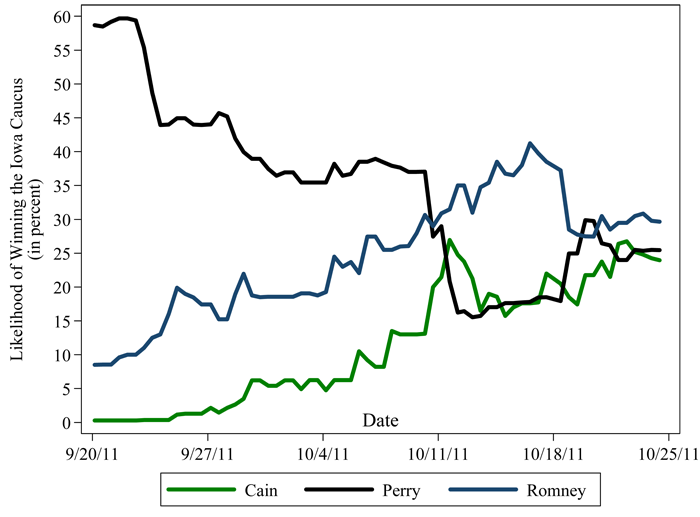 The Ticket
The TicketRomney is the likeliest nominee, but Perry is stronger than you think in Iowa, according to predictions markets
The early caucuses and primaries in the presidential nominating process are sometimes as much about expectations as they are about winning. If a candidate does not campaign very much in a state, a numerically unimpressive finish might be considered a surprisingly strong showing by the pundit class. And if a candidate is expected to do poorly but finishes second--as Bill Clinton did in New Hampshire in 1992--that can propel him or her to future victories in states with larger numbers of delegates.
With ten weeks to go before the Iowa caucuses, where the first votes will be cast in the 2012 Republican presidential campaign, the expectations among political analysts of how each candidate will perform in January and February are beginning to harden. Here is a quick look at how Intrade's prediction markets handicap the first five contests: Iowa, New Hampshire, South Carolina, Florida and Nevada.
Mitt Romney is considered the likely winner of each one of these contests, but the judgment of the markets in two of the first three--Iowa and South Carolina--is extremely close. As the likely winner of the first five caucuses and primaries, Romney is, not surprisingly, also the likely winner of the Republican nomination. As of today, the markets give Romney about a 2 out of 3 chance of heading up the Republican ticket in November.
The Iowa caucuses, however, are a toss-up, a statistical dead heat among Romney (about a 30 percent chance of winning), Rick Perry (about 26 percent) and Herman Cain (about 25 percent). Iowa is also, so far, the best opportunity for Michele Bachmann and Ron Paul to make a surprise showing. The winners of August's Iowa straw poll are each given about a 9.5 percent chance of winning the state's first-in-the-nation caucuses by the prediction markets.
As I have discussed before, the predictions markets sometimes disagree with recent polling. Perry has languished in the single digits in Iowa lately, but the markets still regard him as a strong contender.
This chart illustrates how the likelihood of winning the Iowa caucuses has changed over the past month for Cain, Perry and Romney, according to the markets.
New Hampshire will not be as close a race as Iowa, according to opinion polls, and this time, the prediction markets agree. As I am writing this, Romney's likelihood of carrying New Hampshire is almost 84 percent. The chances for Cain and Perry are under 4 percent for each of them. The expectations will change should one of them win in Iowa, but no matter what happens in the caucuses, Romney will almost certainly be the favorite in the nation's first primary.
In mid-September, Perry was given a more than 60 percent likelihood of carrying South Carolina by the markets. Now, Romney has caught up to Perry, with the markets giving the former Massachusetts governor a 41 percent chance of winning the first primary in the South. Perry, the governor of Texas, is just under 40 percent. Despite a strong showing in recent polls, Cain is given only about a 19 percent chance of winning South Carolina by the markets.
If Romney wins each of the first three states, which represent diverse groups of Republicans, the markets will almost certainly expect the rest of the nominating process to turn into a rout. Florida and Nevada are already seen as likely going to Romney. He is at 65 percent in Florida and at 78 percent in Nevada. But these predictions are heavily dependent on the assumptions the markets are making for what will happen in Iowa, New Hampshire and South Carolina.
The predictions will change in correlation with each other. Because the presidential nominating contests occur sequentially, we will be able to see how the predictions move when candidates meet, or miss, the expectations that have been set for them.
Watch the numbers move in real-time here. I look forward to updating you as they progress.
David Rothschild is an economist at Yahoo Research. He has a Ph.D. in applied economics from the Wharton School of Business at the University of Pennsylvania. His dissertation is in creating aggregated forecasts from individual-level information. Follow him on Twitter @DavMicRot and email him at PredictionBlogger@Yahoo.com.
More popular Yahoo! News stories:
• Herman Cain says abortion should be outlawed
• Did President Obama want American military troops to remain in Iraq?
• Perry unveils comprehensive tax plan




